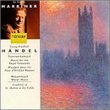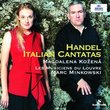| All Artists: Hans Rott, Sebastian Weigle, Munich Radio Orchestra Title: Hans Rott: Symphony No. 1; Orchestral Works Members Wishing: 0 Total Copies: 0 Label: Arte Nova Classics Release Date: 5/10/2005 Genre: Classical Styles: Historical Periods, Modern, 20th, & 21st Century, Symphonies Number of Discs: 1 SwapaCD Credits: 1 UPC: 723721103156 |
Search - Hans Rott, Sebastian Weigle, Munich Radio Orchestra :: Hans Rott: Symphony No. 1; Orchestral Works
 | Hans Rott, Sebastian Weigle, Munich Radio Orchestra Hans Rott: Symphony No. 1; Orchestral Works Genre: Classical
|
Larger Image |
CD DetailsSimilarly Requested CDs
|
CD ReviewsBloody Rott!--a Lost Brucknerian... Sébastien Melmoth | Hôtel d'Alsace, PARIS | 08/27/2007 (5 out of 5 stars) ". 'Tis doubtful we'll ever really know what happened with Hans Rott. One version is he died of TB; another version, suicide. He may have been syphilitic; or, schizophrenic. By whatever means, he died young and mad. Too bad, for he was a native Viennese in the extremely interesting milieu of Bruckner, Brahms, Wolf, and Mahler, et alii. He is reputed to have been a talented keyboardist, but as to compositions, this E-major Symphony is virtually all that's left us. Since its rediscovery, readings abound: Symphony in E Major , Hans Rott: Symphony In E Major , Hans Rott: Symphony in E major , Hans Rot: Symphony in E major . At this bargan price, worth a peep for Art fans of the Era. ." 4.5 stars - another outstanding recording of Rott's only sym Larry VanDeSande | Mason, Michigan United States | 02/18/2009 (4 out of 5 stars) "The Symphony in E major by Hans Rott was first recorded in 1989 by Gerhard Samuel and the Cincinnati Philharmonic Orchestra, which was said to be a student orchestra but which sounded mysteriously like the Cincinnati Symphony of the day. Samuel's taut, classically-oriented reading of the score was a sensation around the world, telling us all about a new symphony never before heard.
Since that time, three other conductors and orchestras have recorded the music. Dennis Russell Davies recorded it with the Vienna Radio Symphony Orchestra (I haven't heard that one) and Leif Segerstram recorded it for (expensive) BIS with a Swedish orchestra. I've heard that one and I'd call it a massive failure, an attempt to turn the romantic era Rott into the most dour and slow-moving Sibelius. This recording, under the baton of Sebastian Weigle leading the Munich Radio Symphony Orchestra, was recorded in 2003. When I first heard this, I was certain Weigle's reading was much lengthier than Samuel's. It was a great shock to me to read the respective timings and find there was almost no difference between the two. Where Samuel is more direct delivering the music in a way Toscanini might have, Weigle's way is more humane, more romantic, and -- like the notes to this recording do -- links the composition musically to Anton Bruckner. Rott, who died young (1858-84), was a student of Bruckner and a friend to Mahler, who borrowed themes from the third movement of this symphony in his own first symphony. The link between the two great late romantic composers and the only symphony of Hans Rott is clearly the vision Weigle meant to project. His romantic approach is most clearly characterised during the final reprieve of the first movement's big main theme, where the music sound eerily similar to the same section of the first movement of Barber's Violin Concerto. Samuel, meanwhile, focuses more clearly on the energy in the music. His reading reminds me more of Mendelssohn than either Bruckner or Mahler, although affects of the latter are sprinkled throughout Samuel's reading. Weigle leads a reading of more humanity, simliar to what I think Bruno Walter or Clauido Abbado may have done with this music. Weigle is similarly moved in the two other pieces on the recording, Rott's inconsequential Orchestra Prelude in E major and A Prelude to Julius Caesar, a piece reminiscent of both Elgar and Meistersinger in its opening that turns more to Tchaikovskian romance as it goes on. I think Weigle's way works splendidly with the music, with a few tiny reservations. He sometimes takes too long to get to the point and his finale is, to me, quite deliberate. These are not faults, only my personal preferences. I also prefer Samuel's cleaner textures, greater directness, the playing of his orchestra and the sound of his recording, the reason I graded it higher than this one. Anyone coming to this music for the first time cannot make a mistake buying this recording, which, with a $6.98 list price, is about as cheap as any new CD anywhere. It comes with informative notes about the composer, his works, the orchestra and conductor -- which is more than I could find in any of the 2008 Penguin Guide, 2005 All Music Guide or 2000 Third Ear Classical Music, which, between them, did not allocate a single sentence to this composer or his great Symphony in E major. They missed the boat, but you don't have to. Get this recording or Samuel's and enjoy one of the great missing masterpieces of the late romantic era." |

 Track Listings (6) - Disc #1
Track Listings (6) - Disc #1




